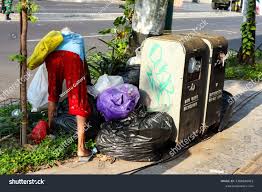….It strips people of human dignity – Sociologists
By Alade Adisa
With the dire economic situation in the country, more Nigerians are forced to scavenge or beg for foods at social gatherings or from dust bins of other people.
The development has led to organisers of social events to now make it a point of duty to employ security men in controlling the influx of unwanted guests to their events.
Despite the effort, it is not uncommon to see women, men and children swarming around event centres to solicit for food.
Narrating his experience to New Daily Prime, Mr Abiodun Olaore, who held a burial ceremony for his late mother in Agege area of Lagos recently, said it was a Herculean task trying to control crowd of uninvited guests from taking over the venue.
“We gave out invites to guests we expected at the event and there was strong instruction to the security men who manned the entrances that on no account should anybody without the invite come in. Despite that, a lot of people still milled around the venue. They were harassing our guests. Apart from events like ours, it is now common to see people going about scanning dust bins for left overs.”
University dons speak
In chats with New Daily Prime, two university lecturers have said scavenging or begging for food strips people of human dignity and it has dire social and health consequences for the society.
The sociologists, Professor Bisi Ajala of the University of Ibadan, Oyo State and Associate Professor Samuel Oluranti of the Lagos State University, LASU, Ojo, opined that scavenging for food is not part of the African culture and has become pronounced because of serious economic hardship in the land.
They therefore, called on the government to put in place various social safety nets to reduce poverty in the land.
Ajala said, “The consequences are health, social and even political. Food that people scavenge for are leftovers that may have been exposed to the elements of weather. The food items may have gone bad. It could have been feasted on by flies and other disease vectors.
“From the social angle, it is demeaning and erodes the status of those who engage in it. The biggest implication is on the larger society. Development is measured with regards to the well being of the citizens and when you talk about the well being of the people, food is an essential component. If you don’t eat well, you may not be healthy and when you are not healthy, how can use be useful to the society.
“If the citizens are not feeding well, then it means the society has zero development. Food is basic. If the citizens are now limited to scavenging to survive, then the society is gone. Also, what that shows is that the production level in the society is also low. Production cannot be in high level and people won’t have what to eat.
“If a large portion of the society is now left to scavenge to survive, then, what type of leaders would they produce? There will be no opportunity to produce good leaders. People would have been turned to beggars and any token thrown at them would seem like a lifeline.”
In his opinion, Oluranti blamed abject poverty in the land for the menace.
“Poverty has led people into doing this. That is the main cause of the ugly practice. It is not African. People don’t like to beg for food. Food that they don’t know who prepared and for what purposes. I have seeing that a number of times.
“It is a ridiculous thing. Those who engage in it are looked down upon and people see them as of low esteem. Begging is not part of our culture and people have their ego they want to protect and which they want others to respect. It exposes people to ridicule and can negatively affect the reputation of a family. If for instance, the person who goes out to scavenge or beg is seen by somebody who knows her, it would become a matter of gossip here and there.
“When you take a child along to do that, you are teaching him or her how to beg, how to be dependent on others. In that way, the ugly trend would continue. We know some people who do that and you can see that their children somehow inherit such abnormal practice from them. A child that is taken along to beg for food is also exposed to ridicule and his esteem taken down to the lowest level.
“There should be a way to take care of the poor. Social policies must be put in place to alleviate the poverty people face. The sharing of palliative in public places is not the solution. That is why we had those terrible incidents in Ibadan, Abuja and Okija. Social safety nets must be put in place.
“It is also unfortunate that the extended family bond has broken down in our society. In those days, people who were better off were helping others to train and take care of their children but now, that is no longer the situation.”

